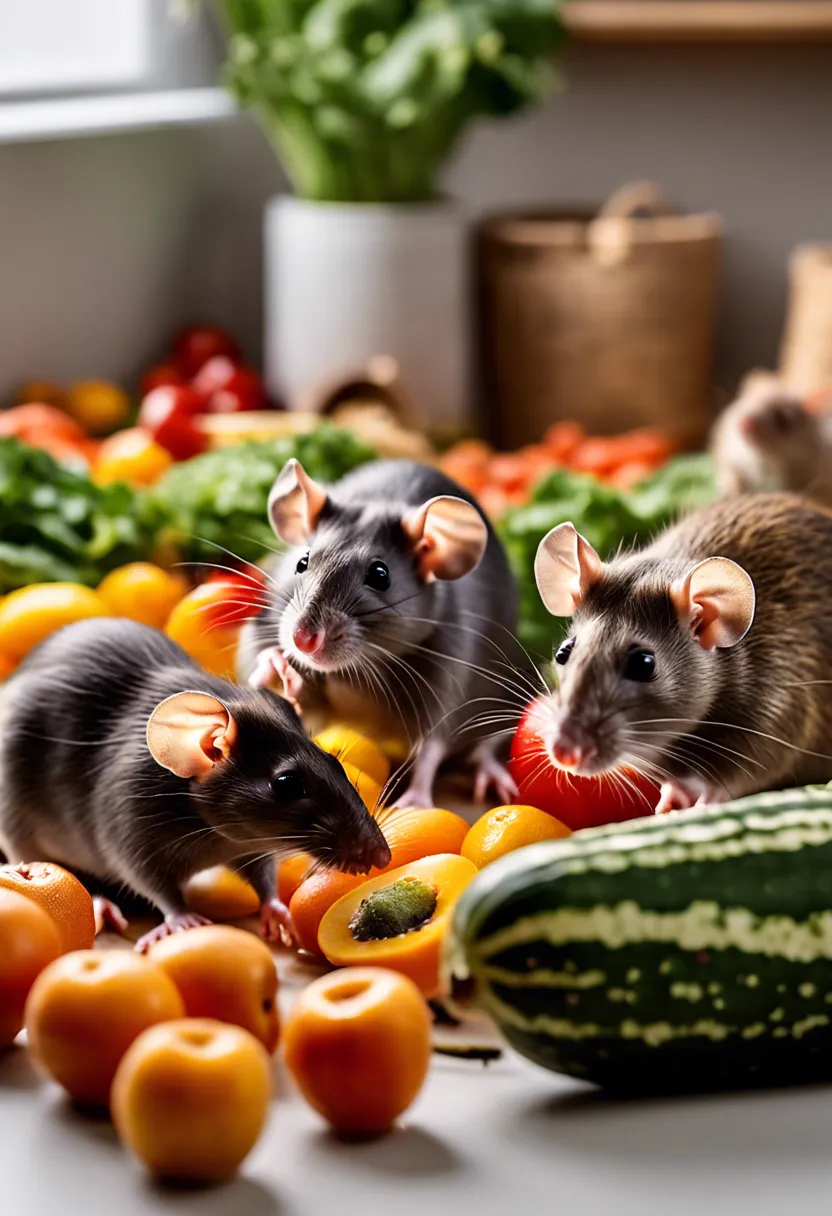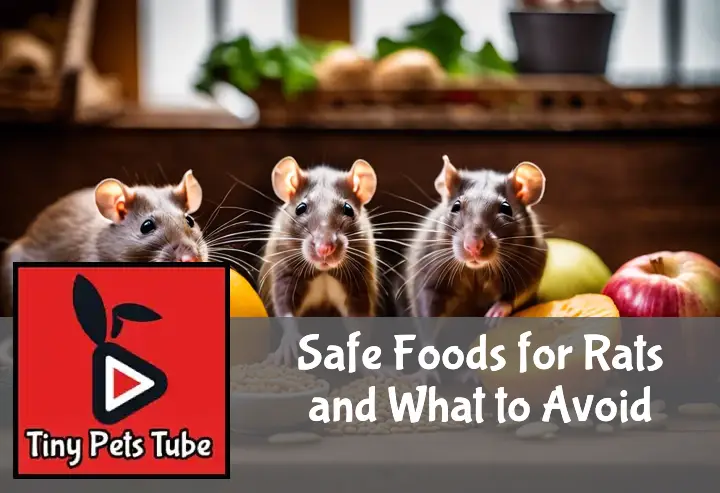Ever looked into those beady little eyes of your pet rat and wondered, “What on earth do you eat?” Well, you’re not alone! I’ve been there too. When it comes to our furry friends, diet is a big deal. And that’s why we’re here to talk about Safe Foods for Rats.
But hold onto your whiskers, because this isn’t just a list of foods. Nope! We’ll also be diving into the deep end of ‘what not to feed’ these adorable critters. So buckle up and keep reading about Safe Foods for Rats and What to Avoid. Trust me, it’s going to be one heck of a ride!
Key Takeaways
- Rats can safely eat a variety of fruits, vegetables, and grains such as apples, carrots, and brown rice.
- Avoid feeding rats citrus fruits, raw beans, raw sweet potato, green bananas, and foods high in sugar or fat.
- Chocolate is toxic to rats and should be avoided.
- Always provide fresh water for your rat.
- Moderation is key; even safe foods can cause health issues if overfed.

Why is a Rat’s Diet Important?
Well, my friend, let me tell you something. The rat diet importance can’t be overstated. It’s like the key to their little rat kingdom. A balanced diet for our furry friends plays a pivotal role in their health and well-being.
The Role of Nutrition in a Rat’s Health
Now, don’t get me wrong. Rats aren’t exactly picky eaters, but that doesn’t mean they should munch on just anything. Proper rat nutrition benefits them in many ways. It contributes to their overall health, longevity, and vitality.
You see, essential nutrients for rats are like magic potions that keep them hale and hearty. They need proteins for growth, carbohydrates for energy, and fats for…well…fat stuff! Vitamins and minerals? Those are the cherry on top!
But here’s the deal: if we neglect these dietary needs for rats, it’s not going to end well. So remember folks – feed your rats right!
Impact of Poor Diet on Rats
Let’s talk about what happens when we ignore the consequences of inadequate rat diet. Picture this: your rat starts looking more like a balloon than a rodent – yep, that’s obesity due to poor diet.
And it doesn’t stop there! Malnutrition isn’t just about being underfed; it can also result from an imbalanced diet lacking essential nutrients. This can lead to all sorts of nasty stuff like weak bones or dull fur.
Worse still is disease susceptibility from bad rat diets. Without proper nutrition, our little buddies’ immune systems can take a hit making them more prone to illness.
So folks, let’s keep our rats healthy by providing them with safe foods for rats! After all, they deserve nothing but the best grub around!
What Foods are Safe for Rats?
When it comes to safe foods for rats, variety is the spice of life. A balanced rat diet should be a smorgasbord of fruits, veggies, proteins, grains, and the occasional treat.
Fruits and Vegetables
Fruits and veggies are like the superheroes of a healthy rat diet. They’re packed with vitamins and minerals that keep your little furballs healthy. Apples, bananas, broccoli – you name it! But remember folks, not all heroes wear capes. Some fruits like grapes or cherries need to be given in moderation due to their sugar content. So balance is key when feeding rats fruits and vegetables.
Proteins and Grains
Moving on to proteins and grains – these guys are the building blocks in your rat’s diet. Think of them as the bricks and mortar holding up Ratville. Good sources include cooked chicken or turkey for animal-based protein, while lentils or quinoa can provide plant-based proteins for rats. And let’s not forget about whole grains! Brown rice or oatmeal are great options here.
Treats and Supplements
Finally we come to treats and supplements – the cherry on top of our balanced rat diet cake! Treats should be just that – treats! Not an everyday thing but a once-in-a-while reward. As for supplements, they can help fill any nutritional gaps in your rat’s diet. But remember folks, always consult with a vet before adding any new dietary supplements into your pet’s routine.

What Foods Should be Avoided by Rats?

You know, rats are like us humans in many ways. They need a balanced diet to stay healthy and fit. But not all foods are safe for our furry friends. Some can cause rat diet dangers or even be toxic foods for rats. So, let’s dive into the nitty-gritty of what’s off the menu for these little critters.
Harmful Fruits and Vegetables
Rats love fruits and veggies, but some can be downright dangerous. For instance, green bananas can cause constipation, while raw sweet potatoes may lead to cyanide poisoning – yikes! These are examples of toxic fruits for rats and vegetables harmful to rats.
If your rat nibbles on these no-nos, you might notice symptoms like lethargy or loss of appetite – classic signs of rat poisoning symptoms. Instead, opt for safe fruits for rats, like apples (minus the seeds) or blueberries. And when it comes to veggies, stick with broccoli or peas as safer vegetable alternatives for rats.
Dangerous Proteins and Grains
Proteins and grains form a crucial part of a rat’s diet. But beware – not all proteins and grains are created equal! Raw beans contain toxins that can mess with your rat’s digestive system – talk about an icky tummy ache! These fall under the category of unhealthy proteins for rats.
And those fancy artisanal breads? They might seem tempting but could lead to bloating in your rat buddy – definitely a grainy situation to avoid (grains to avoid for rats)! Instead, go with cooked lean meats or scrambled eggs as healthier protein sources (healthy rat protein sources) and oats or brown rice as safe grains for rats.
Unsafe Treats and Supplements
Treats and supplements can be a minefield when it comes to safe foods for rats. Some, like chocolate or caffeinated drinks, are downright toxic (toxic treats for rats). And some supplements can cause more harm than good – think excessive vitamin A leading to bone issues (dangerous supplements for rats).
But don’t worry, there’s still plenty of fun in store for your rat! Opt for fresh fruits as treats and stick with vet-approved supplements. These choices will ensure you’re selecting safe rat treats and beneficial rat supplements, steering clear of those unhealthy snacks (avoiding unhealthy rat snacks).
How to Introduce New Foods to Your Rat’s Diet?
Introducing new foods into your rat’s diet can be a bit like trying out a new recipe. It needs a dash of patience, a sprinkle of observation, and a whole lot of love for your furry friend. Rat diet diversification is crucial for their health and wellbeing. But remember, it’s not about tossing in any old thing from the fridge.
Gradual Introduction Method
When it comes to introducing new foods gradually, think slow and steady. Start by mixing a tiny amount of the new food with their regular chow. This allows your rat’s digestive system time to adjust, reducing the risk of upset tummies.
Over several days, gradually increase the proportion of the new food while decreasing their usual fare. This safe dietary transition for rats ensures they’re getting all the necessary nutrients without shocking their system.
Remember, consistency is key here! Don’t rush the process or you might end up with a grumpy rat on your hands. And trust me, nobody wants that!
Monitoring Your Rat’s Reaction
Now comes the fun part – watching your rat explore their culinary world! Keep an eye out for changes in behavior or physical signs that could indicate dietary intolerance in rats.
If your rat seems less active after trying a new food or if you notice changes in their droppings (yeah, I know it’s gross but hey, someone’s gotta do it), these could be signs of an adverse reaction.
Early identification is key when monitoring rat health post-diet change. If you spot anything unusual, revert back to their old diet and consult with a vet if symptoms persist.
Remember folks, variety might be the spice of life but when it comes to safe foods for rats, always prioritize safety over novelty!
Common Myths About Feeding Rats
Let’s debunk some of the most common rat feeding myths that have been floating around. One of the most pervasive misconceptions is that rats can eat anything and everything. But hey, just because they’re seen munching on scraps in cartoons doesn’t mean it’s a rat-eat-anything world out there!
Can Rats Eat Anything?
Contrary to popular belief, rats can’t just gobble down whatever they find. They have specific rat dietary needs, much like us humans. Sure, they might be more adventurous eaters than your picky poodle, but that doesn’t mean all foods are safe for them.
Feeding rats indiscriminately can lead to serious rat health risks. Just imagine if you ate nothing but junk food – not exactly a recipe for longevity, right? The same goes for our whiskered friends. A balanced rat diet is crucial for their health and wellbeing.
So next time you see your rat eyeing your dinner plate with those beady eyes, remember: not all human foods make safe rat diets. Some could even be toxic!
Are All Human Foods Safe for Rats?
Now this brings us to another common myth: all human foods are safe for rats. Not true! While some human foods make great healthy treats for rats, others can be downright dangerous.
For instance, while your rat might love nibbling on bits of fruits and veggies (hello, antioxidants!), things like chocolate or onions are a big no-no (toxic human foods for rats). And don’t even get me started on alcohol and caffeine – these are seriously harmful!
The key here is moderation and variety in a rat’s diet (rat diet moderation). So yes, while it’s tempting to share your snacks with your furry friend (those pleading eyes get us every time), always remember to discern safe foods for rats from the harmful ones.

To Wrap Up
Nibbling through the world of rat cuisine, we’ve discovered that Safe Foods for Rats are a bit like a well-balanced human diet – plenty of fruits, veggies and lean proteins! Just remember to avoid sticky traps like chocolate and citrus.
So, next time you’re prepping dinner, consider your furry friend. After all, sharing is caring!


